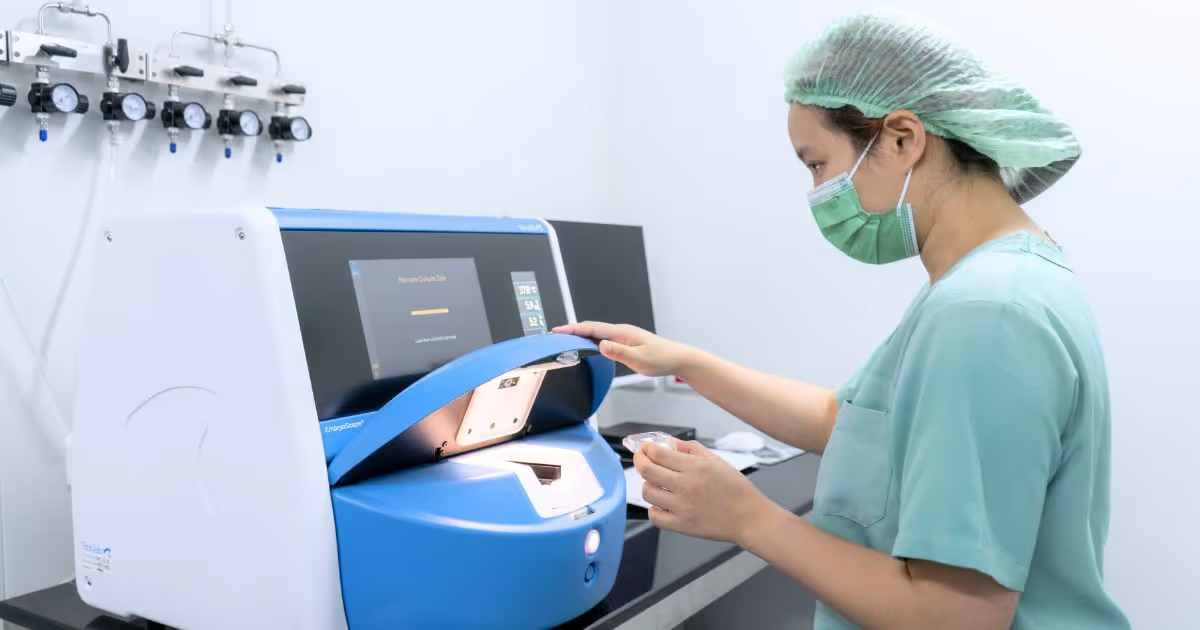Choose the topic you want to read.
- What is EmbryoScope+?
- How does EmbryoScope+ work?
- Why do we need EmbryoScope+ for embryo selection?
- Conventional Incubator vs Embryoscope
- What happens inside EmbryoScope+?
- Who needs EmbryoScope+?
- Benefits of Embryoscope
What is EmbryoScope+?
EmbryoScope+ is a breakthrough in IVF technology. The innovative embryo incubator mimics the physiological conditions inside the mother's womb, while doctors can closely monitor embryo cell division dynamics. Equipped with a camera, images of embryos can be continuously captured and rendered as a time-lapse video, recording every critical milestone of embryo development.
How does EmbryoScope+ work?
Following fertilization through assisted reproductive technology such as IVF or ICSI, the embryos must be meticulously housed within an incubator to ensure their safe and optimal development. EmbryoScope+, a specialized form of incubator utilized within IVF laboratories, offers an ideal environment for nurturing embryos. Equipped with a built-in camera, EmbryoScope+ periodically captures images of the developing embryos at specified intervals, enabling real-time embryo development assessment and eliminating the necessity to take the embryos out of the incubator for inspections. This innovation improves the embryo selection process and enhances the chance of a successful pregnancy.
Why do we need EmbryoScope+ for embryo selection?
The challenge of accurately identifying the most robust embryos for transfer hinders the success rates of the current IVF undertaking. Traditionally, the morphology of embryos is the primary criterion for selecting healthy candidates for implantation, disregarding the dynamic aspects of embryo development. EmbryoScope+ provides continuous monitoring and dynamic data analysis throughout the entire development process, improving selection and success rates of embryo uterine implantation.
Conventional Incubator vs Embryoscope
| Conventional Incubator | Embryoscope |
| Embryos undergo inspections at 16-18 hours, 65-68 hours, and on day 5. Vital details may be missing out when the embryos are not under observation. |
Embryos are under continuous observation, with images captured every 5-10 minutes. Embryologists can readily identify crucial parameters or defects. AI technology can grade and select vital embryos. |
| Embryos must be removed from the incubator for inspection, potentially disrupting their development. |
Embryos are observed unperturbed inside the incubator, minimizing exposure to fluctuating external temperatures and safeguarding the embryos' development. |
With an Embryoscope, the IVF success rates increase by up to 75%, and miscarriage rates decrease by 8-10%.
What happens inside EmbryoScope+?
Inspections of the embryos take place at predefined intervals. Frequent assessments can provide valuable information for embryo scoring. The highest-scoring embryos are considered the most optimal for transfer.
The duration and timing of cell division play a crucial role in pregnancy rates. If the 2-cell stage occurs at 25-27 hours post-insemination, the future pregnancy rate with the embryo will be high.
What is the capacity of EmbryoScope+?
EmbryoScope+ can house up to 240 embryos simultaneously. Each incubator contains 15 embryo dishes, and each dish holds up to 16 embryos.
Who needs EmbryoScope+?
EmbryoScope+ provides stable and controlled culture environments for embryos. The detailed information provided by continuous monitoring offers valuable insights that could make a significant difference for those with recurrent miscarriages, advanced maternal age, or repeated implantation failure.
Benefits of Embryoscope
- The condition inside EmbryoScope+ is stable and suitable for embryo development, ensuring optimal growth.
- Embryologists can continuously monitor embryo development without removing the embryos from the incubator, minimizing stressing the embryos.
- EmbryoScope+ enables embryologists to record over 7,200 minutes of embryo development footage, while conventional incubators provide only a paltry 6 10-minute observation. Embryologists can monitor the cell division dynamic and access valuable data.
- The data available through EmbryoScope+ is precise and comprehensive. AI technology enables healthy embryo selection and increases the chance of implantation and pregnancy.
